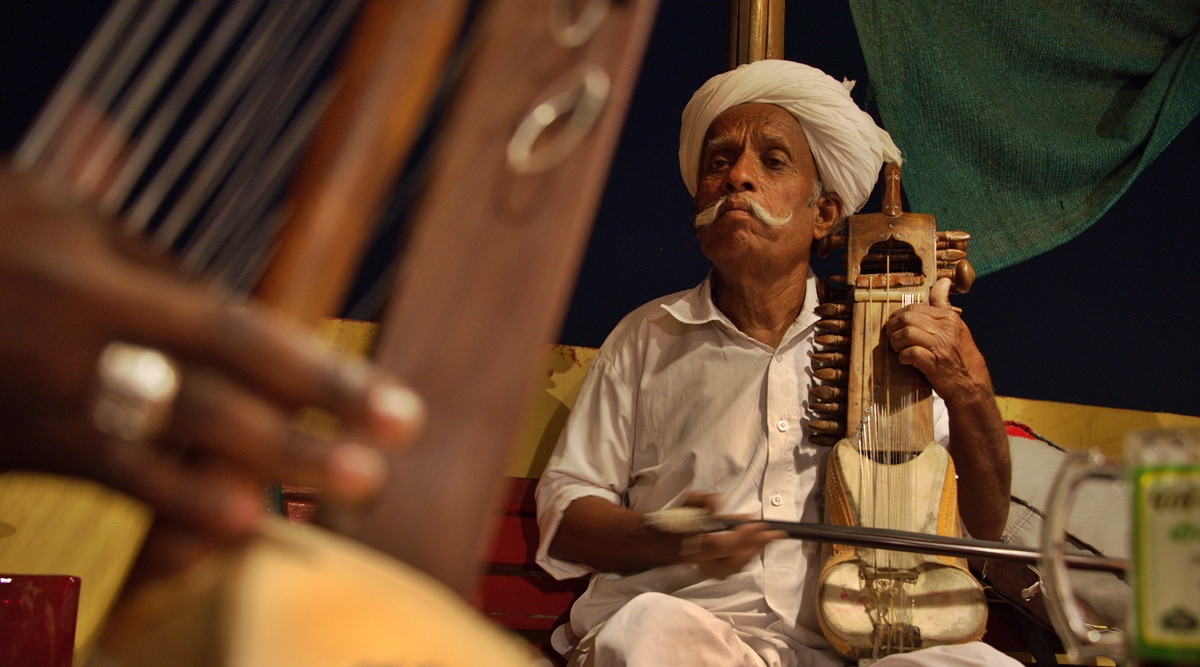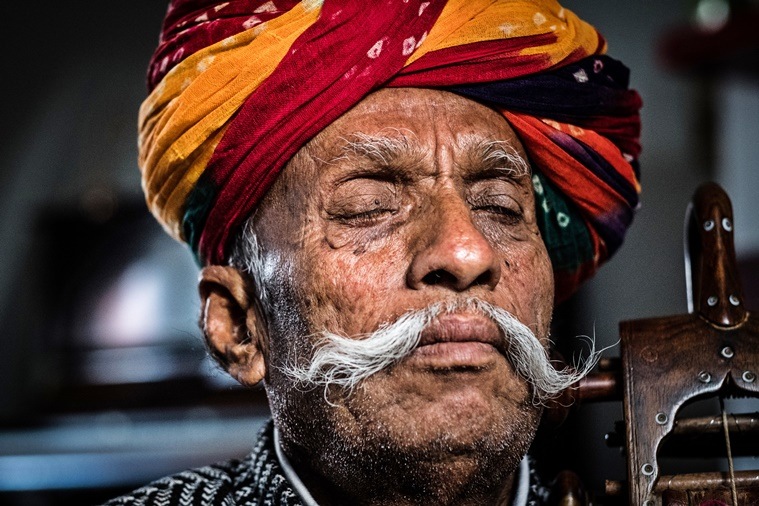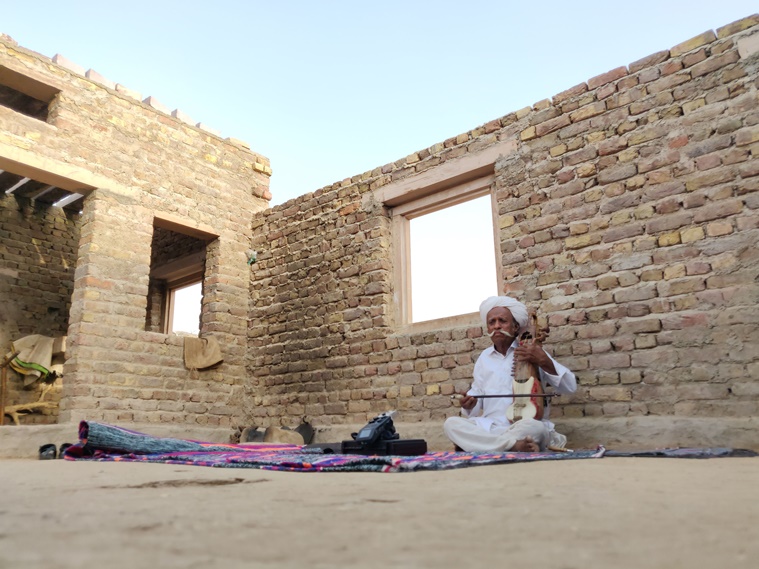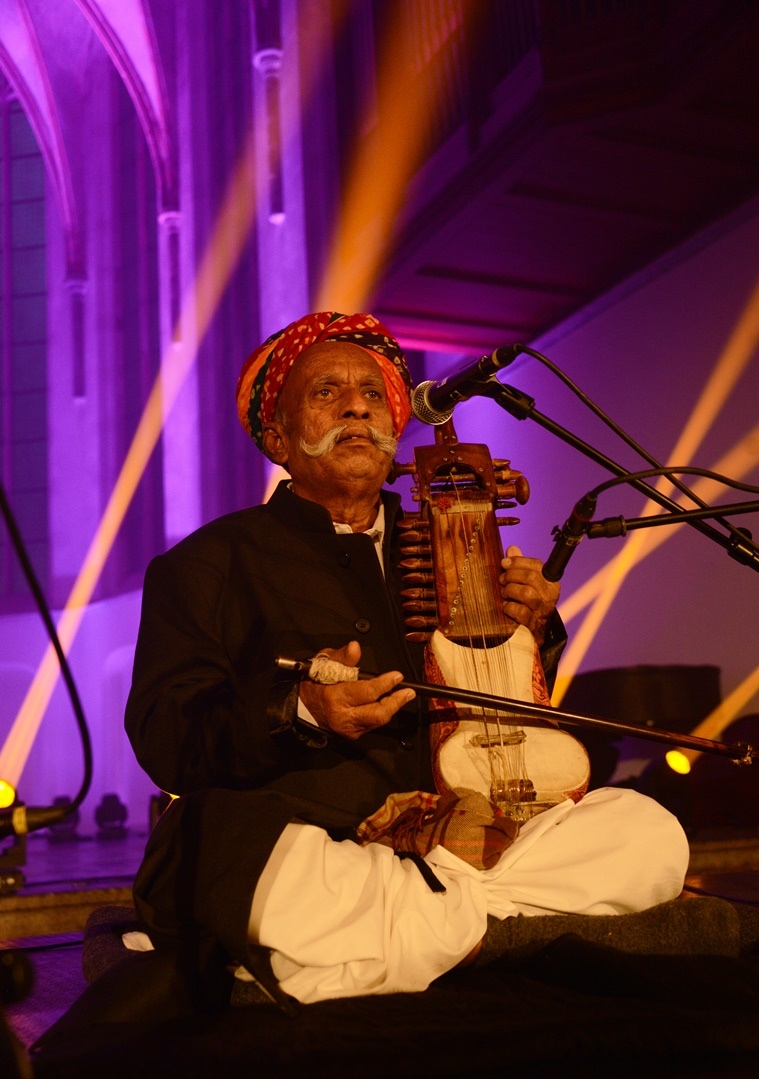 Khan is one of the few players of Sindhi sarangi, a folk fiddle capable of “emulating the human voice”. (Photo: Madou Sidiki Diabate)
Khan is one of the few players of Sindhi sarangi, a folk fiddle capable of “emulating the human voice”. (Photo: Madou Sidiki Diabate) A couple of years ago, at a famous boutique hotel in Jodhpur, a server refused to serve tea and refreshments to the 80-year-old Lakha Khan and his family members. The Rajasthan-based musician had been invited to the hotel for a recording session by Ashutosh Sharma, one of the founders of NCR-based record label Amarras Records. Sharma was aghast that a well-known hospitality group wouldn’t serve food to a legend from their own state.
Khan is one of the few players of Sindhi sarangi, a folk fiddle capable of “emulating the human voice”. He also sings alongside. “After much back and forth, they said they would put out his food in the parking lot because Khan is a Manganiyar while the waiters are from upper castes,” says Sharma, who then decided to pack and leave the hotel immediately. He also took away the travel business he was handing out to them annually through his travel agency.
 Khan was trained at an early age by his father. (Photo: Simon Staun)
Khan was trained at an early age by his father. (Photo: Simon Staun)
Khan didn’t make much of the incident then. He still doesn’t. According to him, these things stopped weighing heavy on him a long time ago. “All this happens. It’s fine. I don’t feel so bad about it anymore,” says Khan over the phone from Raneri, a sleepy little village near Jodhpur. Earlier this week, Khan won a Padma Shri for his contribution to the field of folk music. “The award is a recognition for my music and I welcome it. It will draw attention to this state, to this art form, and to the patronage that it so desperately needs while going ahead,” says Khan in Hindi with a touch of Marwari. “As for the caste system, it is extremely ingrained in people. It probably will change with more education in the future. My grandchildren now go to school. It may change after all,” he adds.
For centuries now, the caste arrangement has been such that the Manganiars, a lower-caste Muslim community, has been attached to Rajasthan’s Rajput community, their jajmaan (patrons) for centuries. Manganiar literally means someone who survives by begging. The musicians, for years, have performed at weddings, childbirth, and family festivity among others. A lot of the songs that the musicians sing are in praise of the Hindu deities and in celebration of Holi and Diwali. Krishna is often invoked in the music. But the system of treating them differently and caste discrimination has persisted for years. The death of a Manganiar in Dantal village near Jaisalmer in 2017, one who was allegedly beaten to death in a temple, rocked the community. As many as 200 from the community fled the village and camped 20 km away from the village under police protection. “They have now become Hindus,” says Khan’s son Pappu referring to the pressures from a few organisations.
 Prejudices stopped weighing heavy on him a long time ago. (Photo: Ankur Malhotra)
Prejudices stopped weighing heavy on him a long time ago. (Photo: Ankur Malhotra)
“It’s unbelievable when a Rajput translator, who is going to earn a living translating Lakha ji, refuses to have water from his house. Like in an auto mode, Lakha ji tells someone to fetch mineral water from outside. To this man, Lakha ji’s brilliance as an artist does not trump caste. And that is a problem,” says Sharma.
Born into a family of musicians from the Manganiyar community, Khan was trained at an early age by his father, also a Sindhi sarangi player. The instrument which is often associated with the Langas, another musician community from the state, has been in Khan’s family for generations, starting from his great-grandfather. As of now, only a handful of Sindhi sarangi players remain, among whom the name of Lakha Khan stands tall. “It is a tough instrument to learn and master, which is why the younger generation among us plays the baaja (harmonium) more. I fell in love with the sound when I would hear my father in riyaaz. I started learning when I was about 10,” says Khan, who still sits outside his small home in Raneri and practises. He recalls spending four anas to listen to a Manna Dey or a Mohammad Rafi song through a bioscope – the portable projector. He would then go back and try to play them on his sarangi.
 During his concerts, he is usually accompanied by his son Dane Khan, who plays the dholak alongside. (Photo: Guess Who)
During his concerts, he is usually accompanied by his son Dane Khan, who plays the dholak alongside. (Photo: Guess Who)
His first performance was in the late ‘70s, under the guidance of musician and ethnomusicologist Komal Kothari, who helped Rajasthani folk music travel out of the state. In 1986, Khan performed in France, his first-ever concert outside India. He toured the UK, Russia and Japan later. But then he fell through the cracks, and was not doing much until Sharma and Amarras’ other founder, Ankur Malhotra, rediscovered him and recorded his music, a lot of it in and outside Khan’s home.
The duo was taken in by Khan’s vast knowledge and the ease with which he could juggle Ram bhajans, Sufi qalams and folktales tied with melody. Khan sings in several languages including Marwari, Sindhi, Hindi, Punjabi and Multani. Often his concerts are replete with odes to Guru Nanak, Lal Qalandar and Lord Ram and Krishna. Also, what’s extremely interesting about Khan is the combination of his sarangi and his throaty yet soft and modulated voice. “We don’t modulate our voices like classical musicians do. That is generally for a certain kind of audience. In folk, we sing to reach the audience in large numbers. Which is why our music is simple and works for everyone around the world even though so many people don’t understand the words we sing,” says Khan.
He resumed international touring in 2013 and toured the US three times with sold-out shows, apart from performing at the famed WOMAX Festival in Finland in 2019. During his concerts, he is usually accompanied by his son Dane Khan, who plays the dholak alongside. Both his sons Dane and Pappu had stopped learning in the middle and gone towards other labour-intensive tasks because they thought this wouldn’t help them earn enough. In the last few years, they have returned to music. Pappu is back to learning Sindhi sarangi. “I hope more people turn up to learn this. Otherwise, there will soon be no one to play the instrument after some years,” he says.